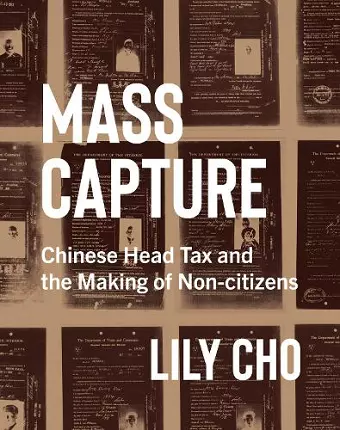Mass Capture
Chinese Head Tax and the Making of Non-citizens
Format:Hardback
Publisher:McGill-Queen's University Press
Published:15th Nov '21
Currently unavailable, our supplier has not provided us a restock date

Exploring how identification photographs function as mechanisms of capture and captivation.
Mass Capture argues the CI 9 documents implemented by the Canadian government to acquire information on Chinese migrants acted as a process of mass capture that produced non-citizens. Cho reveals CI 9s as more than documents of racist repression: they offer possibilities for beauty and dignity in the archive, for captivation as well as capture.
Under the terms of the Chinese Immigration Act of 1885, Canada implemented a vast protocol for acquiring detailed personal information about Chinese migrants. Among the bewildering array of state documents used in this effort were CI 9s: issued from 1885 to 1953, they included date of birth, place of residence, occupation, identifying marks, known associates, and, significantly, identification photographs. The originals were transferred to microfilm and destroyed in 1963; more than 41,000 grainy reproductions of CI 9s remain.
Lily Cho explores how the CI 9s functioned as a form of surveillance and a process of mass capture that produced non-citizens, revealing the surprising dynamism of non-citizenship constantly regulated and monitored, made and remade, by an anxious state. The first mass use of identification photography in Canada, they make up the largest archive of images of Chinese migrants in the country, including people who stood no chance of being photographed otherwise. But CI 9s generated far more information than could be processed, and there is nothing straightforward about the knowledge that they purported to contain. Cho finds traces of alternate forms of kinship in the archive as well as evidence of the ways that families were separated. In attending to the particularities of these images and documents, Mass Capture uncovers the alternative story that lies in the refusals and resistances enacted by the mass captured.
Illustrated with painstakingly reconstituted digital reproductions of the microfilm record, Mass Capture reclaims the CI 9s as more than documents of racist repression, suggesting the possibilities for beauty and dignity in the archive, for captivation as well as capture.
"Lily Cho pays homage to the subjects of these captivating photographs by searching for signs of resistance in the archive. She has written a deeply humane book that sharpens our understanding of the racist logics of exclusion that founded the Canadian nation-state. Mass Capture is a rich resource for any consideration of citizenship, photography, and migration." Sharon Sliwinski, University of Western Ontario and author of Human Rights in Camera
"Mass Capture is a terrific book, full of careful insight into a neglected set of state records. Lily Cho writes with passion and a sense of ethical purpose and provides a new way to sleuth histories from the files of officialdom. This book will be a touchstone for future inquiries in photo history." Anthony W. Lee, Mount Holyoke College and author of The Global Flows of Early Scottish Photography: Encounters in Scotland, Canada, and China
“Cho’s monograph is an obvious choice for those interested in Chinese Canadian histories of citizenship and labour, but her focus on aesthetics extends the project’s disciplinary boundaries and potential readership.” University of Toronto Quarterly
“As an invitation to reflect on the relationship between photography, state racism, citizenship, and the archive, the book, as well as its accompanying online resources, provides an arresting visual counterpart to existing studies of the period that will be an invaluable resource for research and teaching.” BC Studies
- Honourable Mention for the Photography Network 2022 PN Book Prize
ISBN: 9780228008163
Dimensions: unknown
Weight: unknown
272 pages